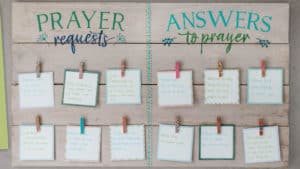“That I may proclaim with the voice of thanksgiving, and tell of all Your wondrous works.” —Psalm 26:7 (NKJV)
It started with a letter from Hope B., a Clubhouse reader from Washington. She wrote: “I want my friend to give her heart to the Lord, but we can’t talk about religion in school. I don’t see her outside of school. Help!”
Telling our friends about Jesus Christ is showing the best kind of love. By wanting to share her faith, Hope is demonstrating that she cares about her friend’s life on earth and in eternity. But could talking about Jesus Christ really be outlawed at her school?
God Talk
Fifty years ago, almost all students in the United States started the day in prayer. Then in 1962, the U.S. Supreme Court ruled that it was unconstitutional for public school teachers to lead a prayer or give a devotional reading from the Bible. Since then some schools have decided their campuses must be a “Christian-free zone”—meaning that students have gotten into trouble for “offensive behavior” that includes reading the Bible (or even having one on a desk), wearing religious-themed clothing, passing out brochures that explain how to accept Christ, doing class projects on biblical characters or even mentioning God in class discussions.
But does this mean it’s a crime to talk about Jesus Christ?
The answer is no. In 1984, Congress passed the Equal Access Act, which said if a middle school or high school received federal money then it couldn’t outlaw Christian clubs if it allowed other extracurricular clubs to meet on campus.
In addition, there have been numerous federal and Supreme Court rulings—including Good News Club, et al. v. Milford Central School—that say public schools cannot censor a student’s right to free speech. That means if students are allowed to express their opinions about evolution or various world religions, then Christian students have the right to talk about their personal relationship with Jesus. (Please note that private schools are not bound by the same laws.)
Although there are a few restrictions about times and places where students can share Christ (like during class when the teacher is instructing), it is not actually legal for Hope’s school to tell her that she can’t witness to her friend! Hope has the freedom to talk about the Good News of Jesus without being punished for it.
Ultimate Law
In many cases, teachers and administrators don’t understand the laws protecting religious freedom in the United States. Schools mistakenly punish Christian kids for sharing their faith.
But part of the problem is that Christian kids and their families don’t know what the law really says. If you take the time to learn your rights, you will be prepared to defend yourself before a situation gets out of hand.
Also, remember what God’s Law, the Bible, says. In Mark 16:15, Jesus delivers what is called the Great Commission, when He tells His disciples to “go into all the world and preach the good news to all creation.” It’s not something you’ve been asked to do; it’s something you’ve been commanded to do. God knows all about the rules at your school, and He’s still in control.
Know Your Rights
• You have the right to discuss your faith with other students in informal settings such as the hallway or cafeteria. But… you do not have the right to break school rules about orderly conduct or talk when you’re supposed to be listening to teachers. Using a bullhorn or standing on a cafeteria table to preach to your friends might get you in trouble.
• You have the right to read your Bible at school. But… you do not have the right to read it when you’re supposed to be doing schoolwork. You can read it during free times, such as at lunch when nothing else is scheduled.
• You have the right to pray over your lunch, tests or whatever else you want to pray for. But… you do not have the right to pray out loud when you are supposed to be quiet (like during a test) or to spend time praying when you are supposed to be doing something else.
• You have the right to pass out church fliers and other religious material in school hallways. But… you do not have the right to pass them out inside a classroom, when it disrupts what the teachers or school administrators are doing. Depending on your school’s rules, you may have to go through an approval process for the flier first.
• You have the right to use Christian-themed notebooks and school supplies.
• You have the right to wear religious-themed clothing, including garments that have Bible verses on them. But… the school has a right to have a dress code, so if your school doesn’t allow messages (of any religion) on clothing, save your Christian T-shirt to wear after school.
• You have the right to meet outside with friends to pray before or after school. (Students meet every year to pray around their school’s flagpole for See You at the Pole.)
• You have the right to organize and participate in a Bible club that meets before or after school. Note: the Bible club must be student-initiated and student-led. According to Congress, it can meet on school grounds if the school allows other extracurricular clubs and it has a teacher or administrator for an adult sponsor.
If you ever run into trouble at school, your parents may want to check out the Alliance Defending Freedom or Gateways to Better Education.













